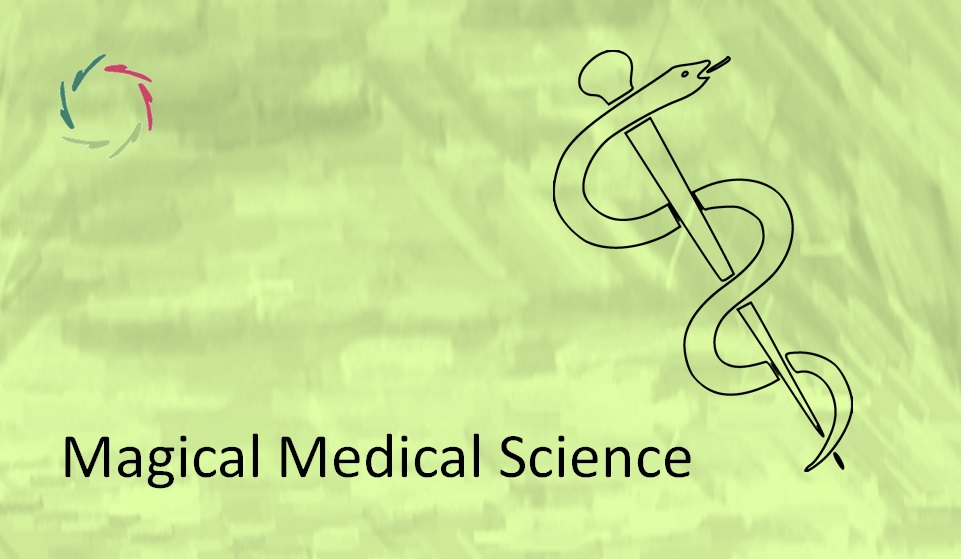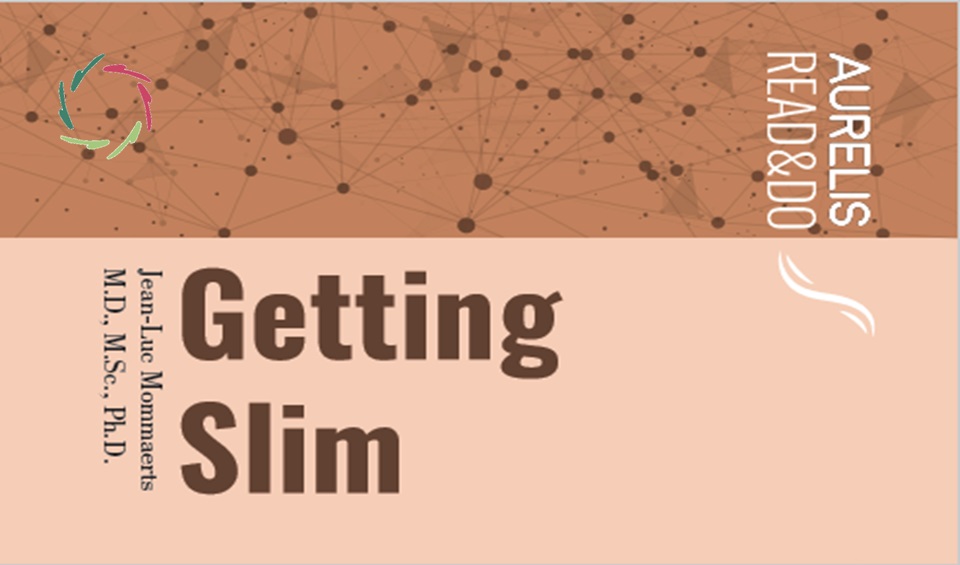Magical Medical Science

Did we get rid of magic in medical science? Should we? Why? How?
About the weirdly snaked figure above
This is frequently used as a symbol for medicine. It is a ‘rod of Asklepios,’ going back to Greek and Egyptian times. Thus, we end in settings of musterion. [see: “Isis’ priests, named ‘therapists’”]
Time to get out?
Around 1800
Modern Western science is the result of the Western Enlightenment reflex to eliminate all kinds of magic that had prevailed in prior ages.
Medicine wanted to be seen as a science as respectable as Newtonian physics. Like Newton, who primarily wanted to find God in the universe through examining His immutable laws, such laws were also suspected to exist in the human body, God’s ultimate creation.
Magic was the demon’s side.
The path beyond magic
The Enlightened path towards science as a counterweight to demonic darkness (‘tenebras’) was twofold: pure rationality (more in France) and experimentation (more in England and Scotland).
We still see both, but with a clear and growing preponderance of experimentation in medical scientific output ― in my view, mainly because it’s more challenging to think than to rashly start playing with experimental set-ups. Anyway, it’s called ‘Evidence Based Medicine’ and is based on double-blind RCTs as ultimate truth tests.
So far, so almost good.
Newtonian physics is conceptual
In short, to reach good experimentation, the best one can do is get rid of confounding factors. This way, a pure case is made towards what one wants to examine. Then, one can measure.
To measure is to know… Is it? [see: “To Measure Is to Know?”]
Placebo = magic?
See this American Society of Pain Management Nursing quote, stating that a placebo is “any sham medication or procedure designed to be void of any known therapeutic value.” [*]
It is void of therapeutic value yet used to deceive people into thinking that it cures them. If that is not ‘magic,’ then I don’t know what is.
That is also the case when using the term ‘placebo,’ then pretending – explicitly or implicitly – that ‘it’ works instead of the study subject or patient as a total person. [see: “Placebo Without Deception?”]
Contrary to this, I quote myself: “Only truth can truly cure.” [see: “Only Truth Can Truly Cure”] In other words, I’m very much against the mindless use of placebo. [see: “Placebo Is Not Good for You”]
Placebo in medicine?
Modern research shows that, quote: “Placebos and treatments often have similar effect sizes.” [**] This is, of course, not the only article in this vein. Also, this doesn’t say that treatments are ineffective. It does say that the placebo effect is probably much higher than is generally thought by the lay public and physicians alike. [see: “How Active is Placebo?“]
Well, that immediately poses a problem. Should we accept this situation, or should we at least try to get beyond it? Remember that modern Western science aims primarily to get beyond it, with double-blind studies as the tool.
But in reality, there are many problems with the ‘double-blind.’ [see: “Double-Blind in the Balance”] That is mainly because the human being is only partly conceptual in practice, contrary to physical objects. The attempt to ‘become Newtonian’ backfires in medicine.
If you treat a person like an object, you lose his organic nature.
In other words, you lose complexity. [see: “Complexity of Complexity – About Being an Organism”] Complexity makes experimentation much more difficult. There are many more confounding factors. Additionally, in the endeavor to get rid of confounding factors, one may unknowingly lose crucial factors. One may lose the noise that eventually may contain that which changes the whole picture.
Especially if that noise is the human mind itself ― not in a conceptual illusion of what it might be to a self-anxious person, but in its complex, organic reality.
And that, my dear reader, puts us in a position of not understanding the depth of placebo, of which I have also written scientifically. [see RG: “The Placebo Effect: How the Subconscious Fits in”]
Not getting this, we don’t master the placebo; the placebo masters us.
That puts us under the spell of magic from within medical science.
By way of placebo in many medical domains, magic covertly crawls through the backdoor where it cannot openly walk through the front door. To many people notwithstanding – including amazingly many medical colleagues – it doesn’t matter what works. If it works, it’s OK. Huge placebo effects are accepted in regular as well as alternative medicines.
But it does matter what exactly works. Equally, it does matter to what aim ‘it’ works. It matters a lot! [see RG: “From “Does it work?” to “What is ‘it’?””
Of course, this is not an assault on medical science.
Quite the contrary, this is an appeal to make the science better equipped to avoid slipping back into magic and become a better tool for truth.
This is what always should be the basis of any scientific effort.
Given present-day ongoing conceptualization, including the way A.I. may even push this further in the near future, there is a mounting danger of magical thinking gaining ground.
AURELIS is probably the most profound counterweight against magic.
By opening the placebo, AURELIS may give some the impression of ‘being about placebo’ ― which it profoundly is. It opens the placebo and shows us who we are. It also shows us a huge part of how we get ill and can get better again, as total human beings, even while to some people, it’s difficult ‘letting go’ of preconceived ideas about themselves as rather more mechanical than organic. [see: “Letting Yourself Go“]
That’s Compassion for you. [see: “Only Compassion Works”]
No abracadabra can change this.
References
[*] Arnstein P, Broglio K, Wuhrman E, Kean MB (2011). Pain Manag Nurs (Position Statement of the American Society for Pain Management Nursing). 12 (4): 225–9.
[**] Howick J, Friedemann C, Tsakok M, Watson R, Tsakok T, Thomas J, Perera R, Fleming S, Heneghan C. Are treatments more effective than placebos? A systematic review and meta-analysis. PLoS One. 2013 May 15;8(5):e62599. doi: 10.1371/journal.pone.0062599. Erratum in: PLoS One. 2016;11(1):e0147354. PMID: 23690944; PMCID: PMC3655171.


